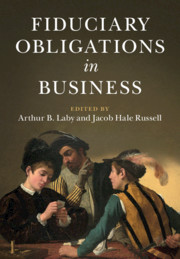Book contents
- Fiduciary Obligations in Business
- Fiduciary Obligations in Business
- Copyright page
- Dedication
- Contents
- Contributors
- Editors’ Acknowledgments
- Introduction The Decline and Rise of Fiduciary Obligations in Business
- Part I Identifying Fiduciaries and Their Duties
- Part II Gaps and Alternatives in Fiduciary Regimes
- Part III Historical and Comparative Perspectives
- Part IV Stakeholders and Society
- 15 Corporations, Directors’ Duties, and the Public/Private Divide
- 16 Stakeholder Impartiality: A New Classic Approach for the Objectives of the Corporation
- 17 Shareholder Primacy in Benefit Corporations
- 18 Self-Interested Fiduciaries and Invulnerable Beneficiaries: When Fiduciary Duties Do Not Fit
- Index
17 - Shareholder Primacy in Benefit Corporations
from Part IV - Stakeholders and Society
Published online by Cambridge University Press: 20 August 2021
- Fiduciary Obligations in Business
- Fiduciary Obligations in Business
- Copyright page
- Dedication
- Contents
- Contributors
- Editors’ Acknowledgments
- Introduction The Decline and Rise of Fiduciary Obligations in Business
- Part I Identifying Fiduciaries and Their Duties
- Part II Gaps and Alternatives in Fiduciary Regimes
- Part III Historical and Comparative Perspectives
- Part IV Stakeholders and Society
- 15 Corporations, Directors’ Duties, and the Public/Private Divide
- 16 Stakeholder Impartiality: A New Classic Approach for the Objectives of the Corporation
- 17 Shareholder Primacy in Benefit Corporations
- 18 Self-Interested Fiduciaries and Invulnerable Beneficiaries: When Fiduciary Duties Do Not Fit
- Index
Summary
The goal of the business corporation traditionally has been understood to be the maximization of shareholder wealth. A growing demand for social enterprise has led to the creation of various new forms of business organization, including the benefit corporation, that have the goal of creating both shareholder wealth and other public benefits. Although benefit corporations were developed to overcome the shareholder wealth maximization norm, it is not fair to say that they also overcome shareholder primacy. Properly understood, benefit corporations are shareholder-centric: they exist to allow shareholders to pursue altruistic goals rather than to require them to do so. This essay demonstrates this from the history and structure of the Model Benefit Corporation Act and argues that benefit corporation legislation ought to remain essentially enabling rather than mandatory in nature.
Keywords
- Type
- Chapter
- Information
- Fiduciary Obligations in Business , pp. 318 - 333Publisher: Cambridge University PressPrint publication year: 2021



